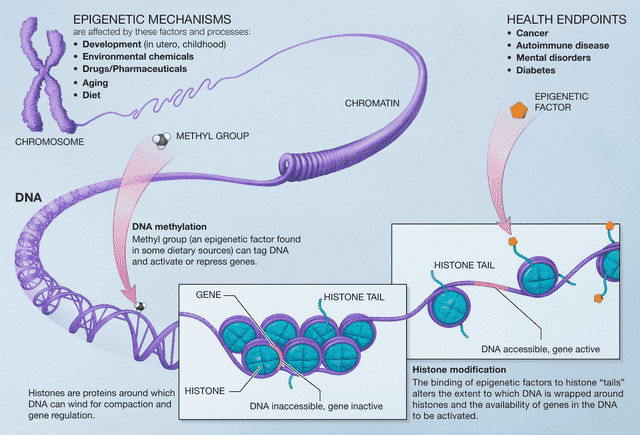Epigenetics refers to changes in gene expression or cellular phenotype that do not involve alterations to the underlying DNA sequence. Epigenetic modifications can have a significant impact on various biological processes, and their role in human health and disease has been an area of growing interest and research. Here are key aspects of the role of epigenetics in human health and disease:
1. Gene Regulation:
- DNA Methylation: One of the most studied epigenetic modifications is DNA methylation, where methyl groups are added to the DNA molecule. Methylation patterns can regulate gene expression, and aberrant DNA methylation has been associated with various diseases, including cancer.
- Histone Modification: Histones are proteins that help package DNA into a compact structure. Post-translational modifications to histones, such as acetylation and methylation, can influence chromatin structure and gene expression.

2. Development and Differentiation:
- Epigenetic mechanisms play a crucial role in embryonic development and cellular differentiation. They help determine cell fate by regulating which genes are turned on or off in specific cell types.
3. Environmental Influences:
- Epigenetic modifications can be influenced by environmental factors, such as diet, exposure to toxins, stress, and lifestyle choices. These environmental influences can have long-term effects on gene expression and may contribute to the development of diseases.
4. Cancer:
- Epigenetic alterations are a hallmark of cancer. Aberrant DNA methylation, histone modifications, and non-coding RNA expression can contribute to the initiation and progression of cancer by affecting the expression of genes involved in cell growth, apoptosis, and DNA repair.
5. Neurological Disorders:
- Epigenetic changes have been implicated in various neurological disorders, including Alzheimer’s disease, Parkinson’s disease, and schizophrenia. They can influence synaptic plasticity, neurotransmitter regulation, and other processes relevant to brain function.
6. Cardiovascular Diseases:
- Epigenetic modifications contribute to the regulation of genes involved in cardiovascular health. Changes in DNA methylation and histone modification patterns have been linked to conditions such as atherosclerosis, hypertension, and heart failure.
7. Inherited Epigenetic Changes:
- Some epigenetic modifications can be passed from one generation to the next, a phenomenon known as transgenerational epigenetic inheritance. This inheritance can influence susceptibility to certain diseases.
8. Therapeutic Implications:
- Understanding the role of epigenetics in disease has led to the development of epigenetic therapies. Drugs that target specific epigenetic modifications are being explored as potential treatments for cancer and other conditions.
9. Biomarkers and Diagnostics:
- Epigenetic changes can serve as biomarkers for disease risk, progression, and response to treatment. DNA methylation patterns, in particular, are being investigated for their diagnostic and prognostic value.
As research in epigenetics continues to advance, it is likely to uncover additional links between epigenetic modifications and human health. The dynamic nature of epigenetic regulation makes it a promising area for therapeutic interventions and a deeper understanding of the complexity of diseases. However, ethical considerations and challenges related to the interpretation of epigenetic data also need to be addressed as this field progresses.












